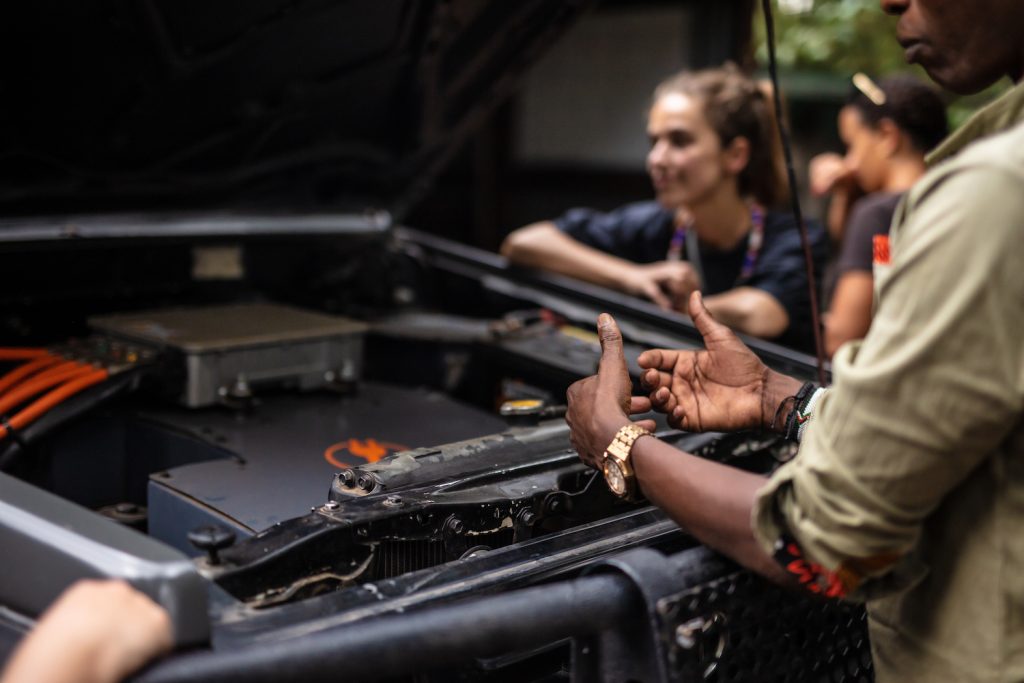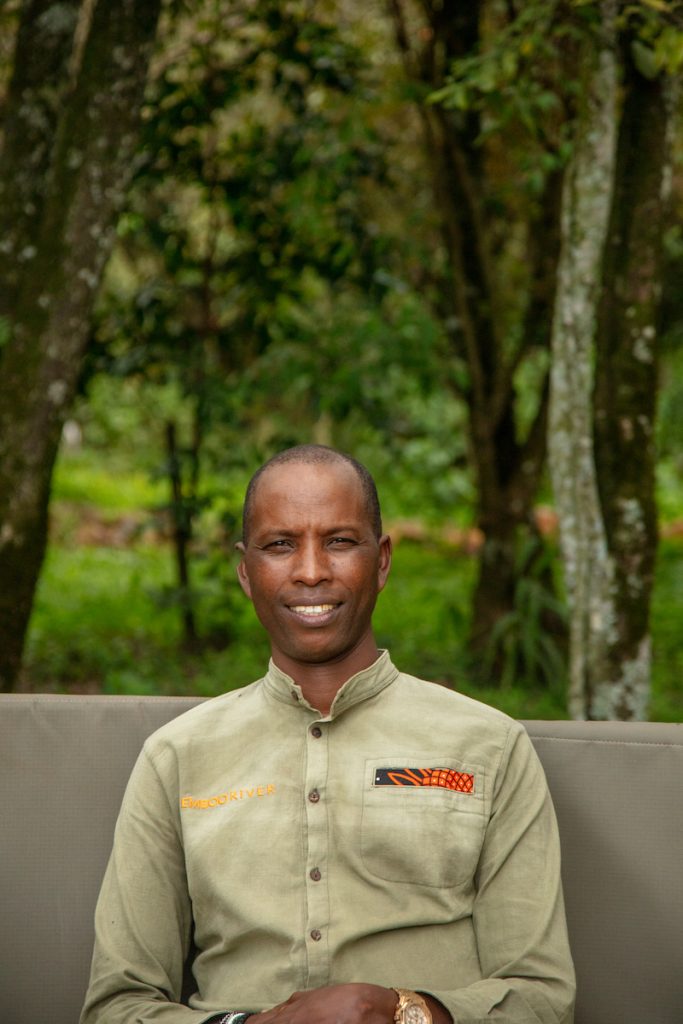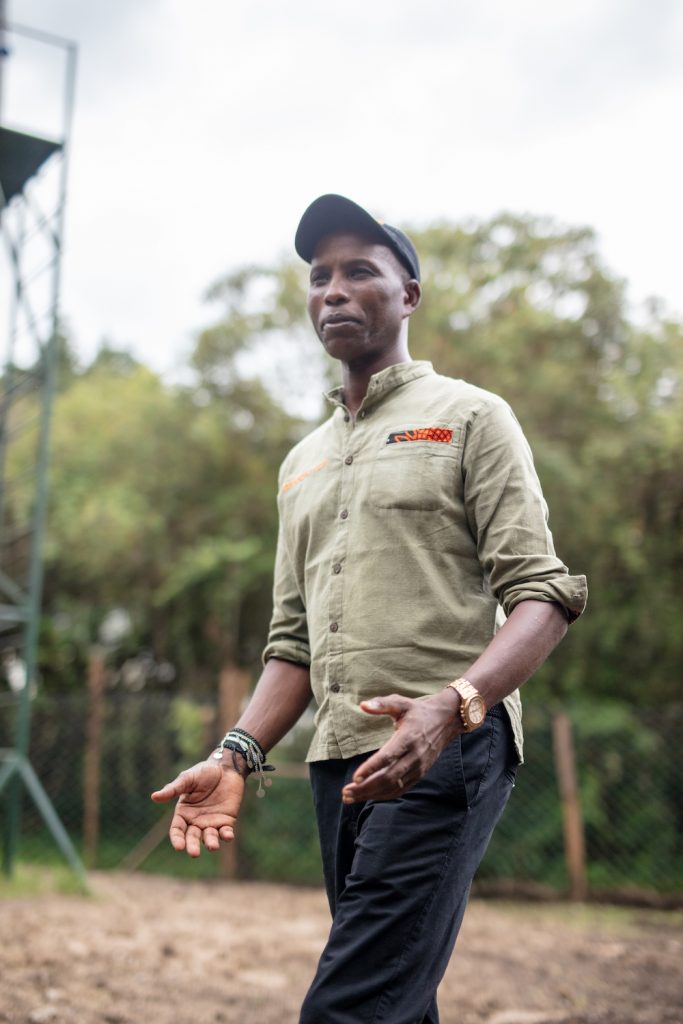INSPIRATION
Getting To Know Emboo’s William Santian

William Partois Ole Santian is the co-owner of the only carbon neutral camp in the Maasai Mara, Emboo River Camp [Emboo]. William is from Lemek Conservancy, 2.5 hours from the camp and has had a long history in the tourism industry in East Africa. The Nomad Team caught up with him to discuss his journey to co-owning a camp in the Maasai Mara and the sustainability efforts he makes in his everyday life.
Tell us a bit about yourself!
I was born and raised in the northern part of the Maasai Mara, in Lemek Conservancy. I never went to high school, I actually dropped out around Year 7 at the age of about 19.
How did you get started in the tourism industry?
I started as a night guard at Rekero, an Asilia Camp. I worked my way up in the camp starting as a night guard for two years, was a rooms steward for a few years, then went on to the kitchen as a cook and subsequently a waiter for a few years then a wildlife spotter and finally a safari guide for 16 years around the East African region.
I was one of the first KPSG (Kenya Professional Safari Guides) silver-level guides in 2005. I also ended up teaching at Koiyaki School for 6 months.
What is KPSG?
KPSG is a certification program for safari guides in Kenya through an examination. It’s a rigorous process. Even though we are locals and born around wildlife, we lack some vital information about the ecosystem that requires you to study.
What did you do after teaching at Koiyaki School?
I taught in the school for 6 months and went back to guiding for quite some time. In 2010 I moved from guiding to management and was an assistant manager at Saruni. In 2014 I became the manager for Saruni camp in the Mara and in 2018 I became general manager and that’s when I met Valery and Loïc, they were guests at the camp.
William Santian Emboo River Camp


What did you discuss during that fateful dinner with Valery and Loïc?
After Valery and Loïc came back from their afternoon/evening safari they were a bit frustrated by what they saw during the game drive. On the drive, the other guides and guests were doing things like throwing garbage and making a lot of noise. Cars were driving poorly and loudly scaring away the animals, if the cars could have been silent it would have made a big difference. So, we discussed the possibility of doing safaris in a silent electric car, also looking at changing ‘The Big 5’ narrative.
What needed to change regarding The Big 5?
The Big 5 had hunting connotations, each the five animals were on every hunter’s radar when he goes hunting and we should be carrying this into our conservation guiding programs. This was another thing I discussed with Valery and Loïc, why not have The Big 20? And we all agreed that we should look and focus on a wider list that has more relevant species on it. We should encourage guests to learn about, and be curious about, the larger ecosystem. For example, I can tell you about the Dung Beatles nesting habits, their interesting movements and behaviour. We can listen to bird calls and learn about the environment and what’s happening around them. Instead of spending five hours looking for an elusive leopard, we can appreciate the landscape around us and maybe we’ll come by a leopard anyway! There’s a need for this kind of guiding all across the industry.
When did you decide to open Emboo River Camp?
We decided to come together during our dinner conversation but took us a year to officially open the fully sustainable Emboo River Camp in 2019. Our camp is probably best known for its electric safari vehicles but we have many other ecosystems in place that are equally as unique as the vehicles.
I did the Eco Tour of Emboo River Camp the other day, what’s your favourite element?
That’s a tough question. I love everything because they connect to each other. There are three main pillars of sustainability for us: the electric vehicles, the waste management – how do we handle the solid waste like plastic, and the waste water both black and grey – how do we recycle its use. I really wanted to do these three right.
Has sustainability always been your passion?
Yes it’s always been a passion but it tremendously grew when we started Emboo. In guiding, we have a code of conduct which I’ve followed throughout my guiding. The number one rule is to take care of the environment, you can’t bulldoze bushes because you want to see a leopard.
Was it a slow build to getting the sustainable elements right here at the camp?
We’re always looking at how we can do things better but we opened Emboo river camp with systems for all three pillars in place. We introduced things like a vegan menu recently.
And you’re vegan yourself right?
Yes, I have been vegan for the past 8 months
What’s been the best part about going vegan?
I see a big health difference, I have more energy and eat less heavy meals.
What’s been the biggest challenge for you going vegan?
Being a Maasai not eating meat is challenging, it’s a traditional dish. We have ceremonies where we have to consume what we consider to be a sacred part of the cow in it. Being vegan, I may not be able to perform these ceremonies but I will try and find things that replace it. Cows are more than just food for us, we can tell if it’s going to rain by looking at a cow’s behaviour. We can use the cows to clear the area through their grazing. The relationship between a Maasai person and their cow isn’t a business, it’s co-existing.
Where would you like to see Emboo River Camp in the next few years?
Three things: I’d like Emboo to be a catalyst for other people and camps to become more sustainable, I would like the community to understand the importance of sustainability in our future, and third I’d like to have a lasting impact on the environment. I want to see a cleaner and healthier environment overall.
Our Top Experiences
SEEN SOMETHING YOU LIKE?
Enquire now and our team will create a custom itinerary tailored to your preferences.

CONTACT
enquiries@nomad.africa
Tel: +254 708 238 738
Purple Nomad Ltd
PO Box 69671 - 00400
Mwanzi Avenue, Nairobi, Kenya



